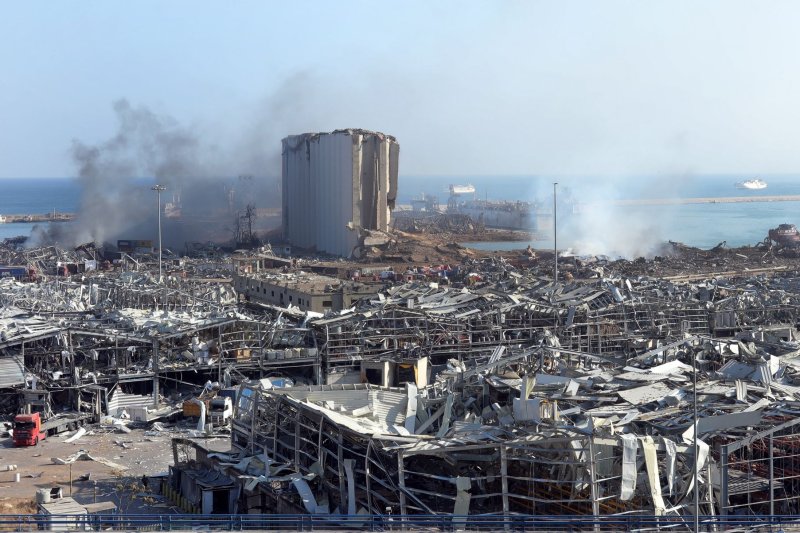1 of 4 | A destroyed silo is seen Wednesday amid the rubble and debris aftermath of a massive explosion in Beirut, Lebanon. Photo by Ahmad Terro/UPI |
License Photo
Aug. 5 (UPI) -- Authorities in Beirut have increased the death count from the devastating explosions on Tuesday to at least 137, while one official said Wednesday it could cost Lebanon's capital as much as $5 billion to recover.
Lebanese President Michel Aoun called for an emergency Cabinet meeting and asked for a two-week state of emergency.
Beirut Gov. Marwan Abboud said about 300,000 were homeless after the blasts and estimated repair costs in the billions. Lebanese Red Cross workers searched abandoned neighborhoods on Wednesday, reporting more than 5,000 injured.
Abboud told local media that damages could range from $3 billion to $5 billion, or "maybe more." The death toll was in the dozens on Tuesday and had risen to triple digits on Wednesday, the Red Cross said.
Officials said they expect the toll to rise as they dig through the debris.
Authorities believe an initial explosion occurred at a warehouse near Beirut's port and ignited a fire, followed by multiple smaller explosions and, finally, a massive blast that caused the most damage. They said stored ammonium nitrate in the area was the likely source.
Seismologists said the biggest explosion was equivalent to a 3.3-magnitude earthquake.
Lebanese Prime Minister Hassan Diab, declaring Wednesday a national day of mourning, has vowed to investigate the explosions and said anyone who may have facilitated them will be held accountable.
Diab said it has long been known that storing ammonium nitrate at the location was a hazard.
The accident could not have come at a worse time for Lebanon, which has been fighting to overcome a major economic crisis because of the devaluation of its currency. Officials said silos that held about 85% of Lebanon's grain were destroyed in the blasts.
Raoul Nehme, Lebanon's economy minister, said seven employees at the port's granaries are missing and that Lebanon now has less than a month's worth of grain reserves.
At least two Instagram accounts were established for those looking for loved ones in Beirut. One of the accounts also is posting lists of people admitted to various hospitals in the city, to help people find family members.
The World Health Organization said it's sending 23 tons of aid from its warehouse in Dubai, including medical trauma kits carrying syringes, bandages and gauze.
Germany has sent a team that includes dozens of search and rescue experts to aid with finding survivors and victims. France, Qatar, Iraq and Kuwait are said they are also sending supplies.
French President Emmanuel Macron announced on Twitter that he would be traveling to Beirut on Thursday to be with the Lebanese people and bring them "the message of French fraternity and solidarity."
"We will take stock of the situation with the political authorities," he said.
French architect Jean-Marc Bonfils was among those killed in the blast, Minister of Culture Roselyne Bachelot said on Twitter.
"France and Lebanon are united in the grief of his death," she said.















